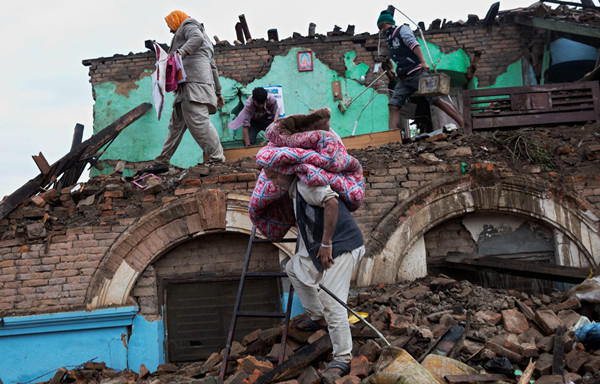Nepalis wait for quake help as death toll passes 4,000
(Agencies/Xinhua) Updated: 2015-04-28 10:37
 |
|
Residents retrieve items from the debris of a house that was damaged in Kathmandu, Nepal's capital, during Saturday's magnitude-7.9 earthquake, revised down from 8.1 earlier. BERNAT ARMANGUE / AP |
Hospitals are full to overflowing, while water, food and power are scarce, raising fears of waterborne diseases.
With aid slow to reach many of the most vulnerable, some Nepalese were critical of the government.
"The government has not done anything for us," said Anil Giri, who, along with about 20 volunteers, was looking for two of his friends presumed buried under rubble. "We are clearing the debris ourselves with our bare hands."
Nepalese officials acknowledged they were overwhelmed by the scale of the disaster.
"The big challenge is relief," said Chief Secretary Leela Mani Paudel, the country's top bureaucrat. "We urge foreign countries to give us special relief materials and medical teams. We are really desperate for more foreign expertise to pull through this crisis."
"My duty to find her"
The situation is worse in remote rural areas. Key highways have been blocked by landslides, and many villages and communities are without water and electricity, surviving on salvaged food and with no outside help.
While aid has begun arriving in the capital, including food, medical supplies, tents and dogs trained for rescue efforts, the authorities are struggling to deliver relief further afield.
Time is running out to find survivors among the rubble of collapsed buildings. In the north of Kathmandu, survivors suspended their search for the night, with plans to resume early on Tuesday.
"We cannot look for missing people ... with a candle in our hands," said Amarnath Prasad, 26, a musician who was helping his best friend look for his missing mother.
"She loved me like her son, and I think it is my duty to find her, dead or alive," said Prasad.
Families and friends of the victims lit hundreds of funeral pyres in towns and the countryside.
Foreign countries escalated efforts to get medical equipment, medicine, food, water, blankets, tents and search and rescue teams into Nepal, but chaotic scenes at the country's main international airport slowed the flow of aid.
India and China were among the first contributors to an international effort to support Nepal's stretched resources.
The United States on Monday announced an additional $9 million in aid for Nepal, bringing total US disaster funding to $10 million.
US Defense Secretary Ash Carter said two C-17 US Air Force transport planes carrying search-and-rescue personnel and supplies were headed to Nepal.
- Fears linger in Nepal as intl aid pours in
- Nepal urgently needs tents, dry food, medicine: official
- Chinese government medical team heads to quake-hit Nepal
- Photographers display beauty of pre-quake Nepal
- Emergency meeting of Nepalese earthquake relief held
- UDZ holds earthquake training session
- Students pray for people trapped in Nepal earthquake
- Factbox-Foreigners in Nepal at time of deadly earthquake






